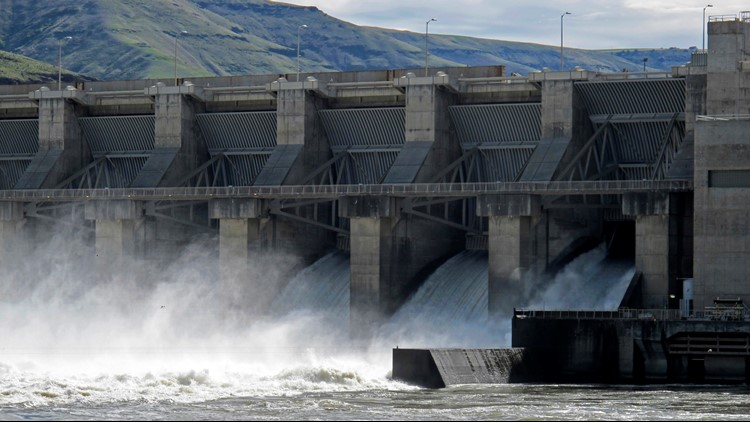SPOKANE, Wash. — Some Republican members of Congress from the Northwest are accusing a GOP Idaho lawmaker of conducting secret negotiations with the Democratic governor of Oregon over a controversial proposal to breach four dams on the Snake River to save endangered salmon runs.
But Rep. Mike Simpson, R-Idaho, replied that he has for several years been telling "everyone who would listen" about his proposal for a comprehensive solution to save salmon.
"How is that secret?" Simpson asked this week. "My staff has had discussions with nearly every governor, member of Congress, and U.S. senator in the Columbia Basin on this proposal."
Simpson's plan to remove the Ice Harbor, Little Goose, Lower Granite, Lower Monumental dams also includes a 35-year moratorium on lawsuits, ending costly litigation over the dams' environmental impact. That provision prompted more than a dozen Northwest environmental groups to oppose the plan. Democratic lawmakers have also been lukewarm to the proposal.
On Wednesday, Reps. Dan Newhouse, R-Washington, Cathy McMorris Rodgers, R-Washington, and Cliff Bentz, R-Oregon, issued a strongly worded statement upon learning of a Freedom of Information Act release detailing coordination between the offices of Simpson and Oregon Gov. Kate Brown regarding the proposal to breach the four dams.
"For months, Rep. Simpson has been speaking with us about his sweeping dam-breaching proposal, touting transparency and an open process while telling us it was simply a 'legislative concept' for the Northwest delegation to consider," the lawmakers, who oppose breaching the dams, said.
"What he didn't tell us was that he has been coordinating for months with Oregon Governor Kate Brown's staff behind the scenes to shepherd his proposal through Congress with little to no support from Pacific Northwest representatives – Republican or Democrat," the lawmakers said.
"It's clear this proposal is not just a starting point, but rather a radical and fully-baked plan he is actively seeking to put into law," they said.
The three Republicans also suggest Simpson's discussions with Brown could hurt an agreement signed last year by the governors of Washington, Idaho, Oregon and Montana to work together on solving an issue that has bedeviled the Northwest for decades.
The documents were released in response to a public information request by the Center for Biological Diversity, a conservation group that opposes Simpson's plan.
"We rarely agree with Rep. Newhouse, but when it comes to removing the Snake River dams, we too insist that there must be a transparent, open process that involves all stakeholders," said Brett Hartl, government affairs director at the Center for Biological Diversity. "A deal made behind closed doors with just the good ol' boys will be worse for salmon, worse for the river and worse for the region."
The center opposes Simpson's proposal, which would suspend key federal environmental regulations and exempt 80 other dams in the Columbia River basin from accountability for clean water and harmful impacts on salmon and other species.
In his statement, Simpson called the Center for Biological Diversity "one of the extreme environmental groups that is opposed to my concept because it would end their business model of keeping the stakeholders in the region in perennial litigation over the four Lower Snake River dams."
Simpson's "Columbia Basin Initiative," proposes removing the earthen portions of the four dams, while making all the regional stakeholders whole. Most of the proposed $33.5 billion cost of the plan would replace the power the dams generate, the barging capacity they provide between the Tri-Cities region of Washington and Lewiston, Idaho, plus irrigation and other benefits.
Brown's office did not respond to a request for comment.
But Simpson on Wednesday issued a statement defending the proposal he has worked on for three years, involving some 300 meetings.
"I expected pushback when this all started," he said. "What I did not expect was colleagues with whom I have worked for a number of years on a number of issues to question my integrity, to insinuate I have lied about my motivation and in fact have nefarious intentions — to — what? Sabotage the economy of my own state?"



